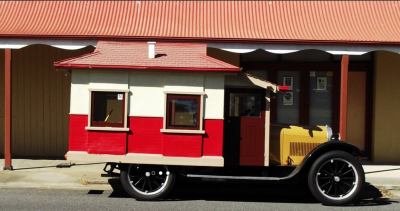
Goolwa History Centre and Museum - National Trust Goolwa

Address: 11 Porter Street, Goolwa, SA 5214
Contact: Anthony Presgrave
Phone: (08) 8555 2221
Website: View website
Goolwa History Centre
A series of permanent and changing exhibitions telling the stories and
interpreting the buildings of Goolwa, Hindmarsh Island and Currency
Creek from pre European settlement to the present day. The archive
contains several thousand files and photographs relating to the town of
Goolwa and the settlements of Hindmarsh Island and Currency Creek. It
also contains the shipping collection of well-known maritime historian,
Ronald Parsons. One of the most unusual items in the collection is Pop
(Gerhard) Kaesler’s “Home from Home” vehicle which he constructed in
1929 from an old Dodge tourer and is generally accepted as one of the
first, if not the first, motor home in Australia. Another significant
item is a double bed patchwork quilt which is believed to have been made
by Emily Augusta Kingdon on the voyage to South Australia after her
marriage in England to Young Bingham Hutchinson in 1852. It is included
on the National Quilt Register. An Archive Collection is available by
appointment only.
The National Trust Goolwa also maintains the Inland Rivers National Marathon Register. The Register provides a valuable record of journeys made along the navigable lengths of the Murray-Darling Rivers and their tributaries terminating at Goolwa, South Australia by individuals and groups, both for leisure and sport. Entry into the Register is by application only by those arriving at Goolwa from points above the SA border in the Murray, or those departing Goolwa upstream to any river destination beyond the SA border.
Open hours; Tuesday, Wednesday, Saturday, Sunday 1.30 to 4pm subject to availability of volunteers.
Karen Ross, in an article on this amazing historical treasure, wrote:
Goolwa is a small town with a big history and if you enjoy seeing evidence and reading stories from days past, then pay a visit to the Goolwa National Trust Museum in Porter Street.
The museum is housed in a building dating back to 1872 and once used as a Blacksmiths shop. You'll recognise it by the stone structure outside. Read more....